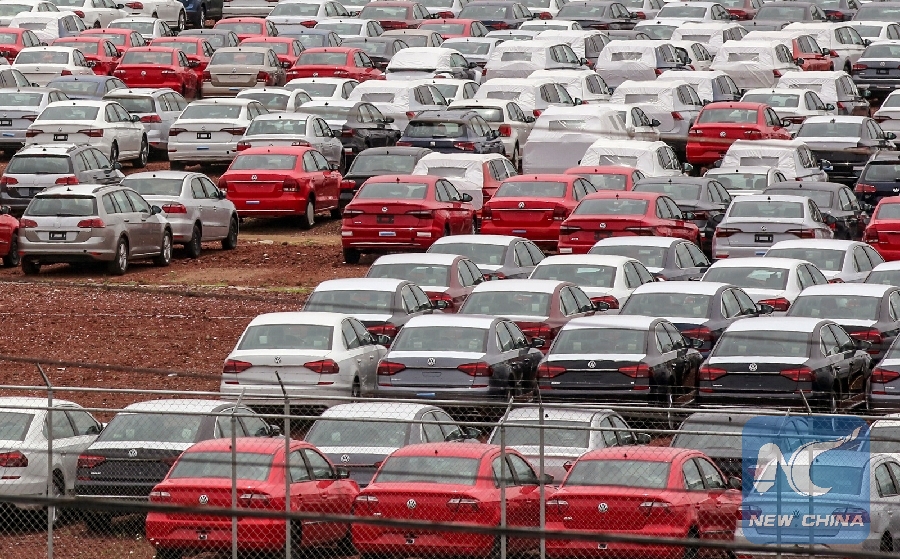
View of cars at the Volkswagen plant in Puebla, Mexico, on Aug. 27, 2018. (Xinhua/AFP)
by John S. Marshall
LAREDO, the United States, Sept. 20 (Xinhua) -- As the drumbeats of a trade war grew louder, a group of business leaders and executives met in a dusty Texas border city to discuss international trade and its future direction as the United States seems increasingly at odds with a number of nations.
The two-day annual North American Logistic & Manufacturing Symposium was closed on Thursday in Laredo, a city built up along the Rio Grande River, a narrow but lengthy waterway that flows for nearly 2,000 miles and forms part of the border separating the United States and Mexico.
A sprawling metropolis of about 250,000 people, Laredo is hardly known as a desirable convention destination, but because of its location it could become a key battleground in terms of trade tension.
More than 557 billion U.S. dollars in imports and exports passed through the city in 2017, according to the Laredo Economic Development Corporation. Mexico was the top trading partner of all those goods, and China was second.
With the United States in disputes with a number of countries over trade deals, including The North American Trade Agreement, or NAFTA -- a trade arrangement between the United States, Mexico and Canada that's been in force since 1994, U.S. President Donald Trump is threatening to cancel the agreement.
He claims that NAFTA killed jobs by encouraging automakers and other manufacturers to open up plants in Mexico, while shuttering U.S. facilities. The president also finds fault with Canada's tariffs, including its tariff on dairy products, which puts U.S. producers at an economic disadvantage.
Trump has repeatedly blasted NAFTA, including calling it a "very unfair NAFTA deal" as he spoke at the inaugural meeting of the President's National Council for the American Worker on Monday.
"It was a terrible deal for this country for many years between Mexico and Canada. It was a horrible deal. We lost thousands of businesses and millions of jobs. And that's not going to happen any more," the president said.
Just days later at the Laredo symposium, the speakers -- mostly veterans of international trade and commerce -- pushed for a toning down on the rhetoric and a peaceful resolution to the escalating trade friction.
One of the speakers was Eric Miller, who heads up Rideau Potomac Strategy Group, a firm that describes itself as a cross-border consultancy that advises clients on government affairs, trade issues, technology and geopolitical developments.
Miller urged negotiators to resolve the NAFTA disagreement with a trilateral agreement. That is a deal with the United States that would include both Mexico and Canada, as opposed to just a bilateral agreement, which would include only Mexico.
"You get additional benefits from having a trilateral agreement that you simply don't get from having a bilateral agreement," Miller told Xinhua, adding "so fundamentally the authority that the president has from the Congress, which is called trade promotion authority, essentially says that he must go about the process of pursuing a trilateral agreement."
Though the first U.S. tariffs, which included a 25 percent tariff on steel and 10 percent tariff on aluminum, only initially targeted a handful of countries in July, they were later expanded to include Canada and Mexico. Canada responded by imposing matching tariffs on July 1.
Miller, who has also served as vice president of policy, North America and Cybersecurity at the Business Council of Canada, which represents the CEOs of the 150 largest companies in Canada, described the tariffs on Canadian steel and aluminum as a "travesty." And despite the matching tariffs imposed by Canada, he claims Canadian officials have been "calm about the U.S. threats."
The result of the increased tariffs, according to Miller and others at the symposium, will end up hitting U.S. consumers in the wallet, while also hurting certain industries, especially the auto industry.
"You are dealing with massive impacts in terms of global trade," Miller said. "In addition, the prices of vehicles are estimated by the Center of Automotive Research to go up between 1,700 and 7,000 U.S. dollars in the United States."
Meanwhile, with negotiators still trying to reach a new NAFTA deal, during a panel discussion, one of the speakers said changes in political leadership typically has an impact on future trade talks.

